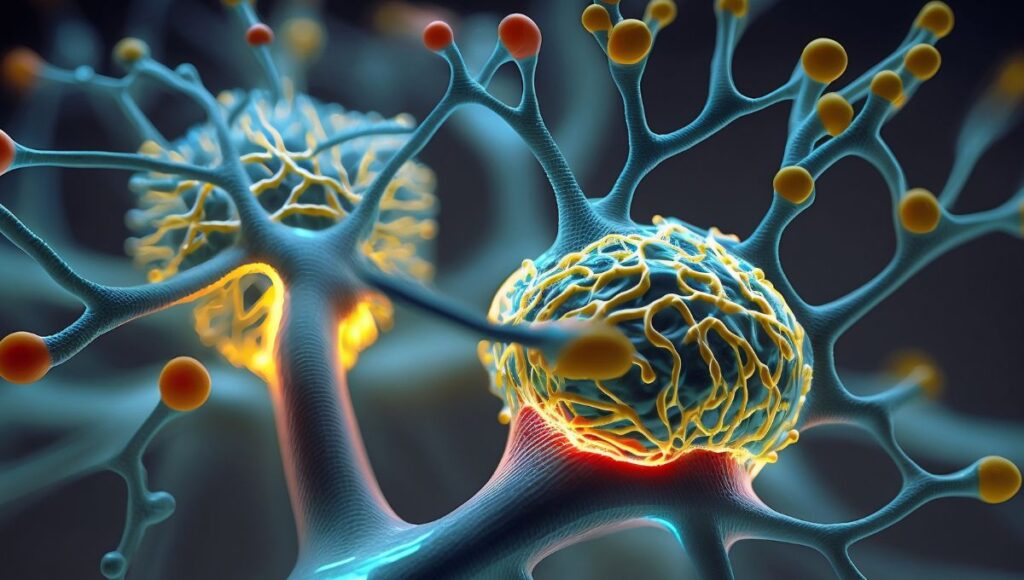
What Does Meditation Do For The Brain? Amazing Insights From Neuroscience
In the labyrinth of neural intricacies that define our minds, meditation emerges as a fascinating practice with profound implications for brain function.
As science delves into the intricacies of the brain, the question persists: What does meditation do for the brain?
Beyond ancient wisdom and modern contemplation, this exploration seeks to uncover the tangible neurological effects of meditation, offering a glimpse into the subtle yet transformative changes that occur within the brain’s intricate tapestry.
Rooted in ancient traditions and practices, the practice offers a valuable pathway to inner calmness and mental clarity.
It is a practice that allows individuals to cultivate mindfulness, focus, and self-awareness. Over the years, meditation has gained remarkable popularity as people seek solace from the chaos of everyday life.
We’ll go over:
- Definition of Meditation
- Growing Popularity of Meditation
- Structure and Functions of the Brain
- Cognitive Benefits of Meditation
- Mental Health Benefits of Meditation
- Physical Benefits Linked to Brain Health
- Importance of Brain Health
Definition of Meditation
Meditation can be defined as a practice that involves training the mind to achieve a state of heightened awareness and non-judgmental attention. While it may have spiritual connotations for some, meditation does not necessarily align with any specific religious beliefs or doctrines.
Instead, it acts as an anchor for individuals seeking mental well-being and self-discovery. Various techniques are employed during meditation sessions, ranging from focused breathing exercises to guided visualization or chanting mantras.

The ultimate goal is to redirect one’s thoughts away from external distractions and into the present moment. By doing so, practitioners can cultivate a sense of inner stillness and tranquility.
Growing Popularity of Meditation
In recent years, there has been an undeniable surge in the popularity of meditation worldwide.
More people than ever before are turning to this ancient practice as a means to cope with the mounting pressures of modern life. One factor contributing to this trend is the growing body of scientific research that supports the numerous benefits associated with regular meditation practice.
Studies have shown how meditation positively affects brain function, emotional well-being, stress reduction, and even physical health. Moreover, influential figures in various fields such as sports, entertainment, and business leaders have openly embraced meditation as part of their daily routines.
As we delve deeper into understanding what exactly happens within the brain during meditation, we begin to appreciate how this practice can lead to profound transformations in our lives.
From altering brainwave patterns to enhancing cognitive abilities and promoting mental health, the effects of meditation are both awe-inspiring and scientifically validated.
Structure and Functions of the Brain
The brain is a fascinating, awe-inspiring organ that holds the key to our thoughts, emotions, and actions.
Nestled within our cranium, this gelatinous marvel weighs around 3 pounds and is composed of billions of neurons that communicate through electrical impulses. But let’s not get lost in the details just yet; first, let’s explore its anatomy.
The brain can be divided into several regions, each responsible for specific functions. The cerebral cortex, often referred to as the “thinking cap,” is where all higher-order cognitive processes occur.

It houses four primary lobes: the frontal lobe (decision-making and problem-solving), parietal lobe (sensory processing), temporal lobe (auditory perception and memory), and occipital lobe (visual processing).
Beneath this cerebral cortex lies a collection of structures known as subcortical regions.
These include the hippocampus (critical for memory formation), amygdala (the emotional center that triggers fear responses), hypothalamus (regulating basic bodily functions like hunger and thirst), and thalamus (the relay station for sensory information). Together, these parts work in harmony to shape our experiences, thoughts, emotions, and behaviors.
What Does Meditation Do For The Brain?: Cognitive Benefits of Meditation
1. Improved Attention and Focus
Meditation has been shown to have a remarkable impact on our ability to pay attention and maintain focus. Through regular practice, individuals often experience enhanced attention span and the ability to sustain concentration for longer periods of time.
This is particularly beneficial in our fast-paced, distraction-filled world, where we are constantly bombarded with information and notifications vying for our attention.
One of the key ways meditation helps improve attention is by reducing mind-wandering.
Mind-wandering refers to the tendency of our thoughts to drift away from the task at hand, leading to reduced productivity and increased stress. By practicing mindfulness meditation, individuals learn to be fully present in the moment and cultivate a non-judgmental awareness of their thoughts.
This heightened awareness allows them to catch themselves when their mind starts wandering and gently bring their focus back to the present moment.
Furthermore, meditation helps improve concentration by training the mind to let go of distractions more easily.
As we become more adept at observing our thoughts without getting entangled in them during meditation, we develop greater mental resilience. This skill translates into improved concentration in daily life as we become better equipped to redirect our attention back to what matters most.
2. Memory Enhancement
Another fascinating benefit of meditation on brain health is its positive impact on memory function. Research suggests that regular meditation practice can lead to improvements in both working memory capacity and long-term memory retention.
Working memory refers to our ability to hold and manipulate information in our minds over short periods. It plays a crucial role in various cognitive tasks such as problem-solving, decision-making, and learning new information.
By engaging in meditation exercises that involve focused attention or visualization techniques, individuals can strengthen their working memory capacity over time.
The heightened state of relaxation and reduced stress associated with meditation also supports optimal brain function for encoding and consolidating memories.

3. Enhanced Creativity
Meditation has long been celebrated for its ability to ignite creativity and foster innovative thinking. By practicing mindfulness, individuals can tap into their inherent creative potential by cultivating a state of open awareness and expanding divergent thinking.
Divergent thinking refers to the ability to generate multiple ideas or solutions to a given problem. Through regular meditation, individuals learn to quiet their inner critic and suspend judgment, allowing thoughts to flow freely.
This relaxed mental state encourages novel connections and associations between ideas, leading to increased creativity.
What Does Meditation Do For The Brain?: Mental Health Benefits of Meditation
1. Reduced Stress and Anxiety
Meditation has long been recognized as a powerful tool for reducing stress and anxiety. When we meditate, our brain’s amygdala, which is responsible for triggering fear responses, becomes less active.
This decreased activity in the amygdala allows us to experience a sense of calmness and relaxation. As we practice meditation regularly, we can train our brain to respond more calmly to stressful situations, leading to a reduction in overall stress levels.
2. Improved Mood and Emotional Well-being
One of the remarkable benefits of meditation is its positive impact on our mood and emotional well-being. Regular meditation practice has been shown to enhance the production of neurotransmitters like serotonin, dopamine, and endorphins — commonly known as “feel-good” chemicals.
These neurotransmitters play a crucial role in regulating our moods and emotions. By increasing their production through meditation, we can experience an uplifted mood, greater emotional stability, and an overall sense of well-being.
3. Managing Negative Thoughts and Emotions
Meditation cultivates self-awareness by encouraging us to observe our thoughts without judgment or attachment. Through this process, we develop greater insight into our negative thought patterns and emotions that may be causing distress or hindering personal growth.
By becoming aware of these negative patterns during mindfulness practice, we can learn to regulate them more effectively in our daily lives.
In addition to self-awareness, regular meditation also reduces rumination – repetitive thoughts about past events or worries about the future that can contribute to anxiety and depression.
By engaging in focused attention during meditation, we train our minds to let go of these harmful thought patterns and bring our attention back to the present moment. This practice enhances resilience by allowing us to navigate challenging situations with a calmer and clearer mindset.

What Does Meditation Do For The Brain?: Physical Benefits Linked to Brain Health
1. A Fountain of Youth for Your Brain
When it comes to brain health, there’s a saying – “What’s good for the body is good for the brain.” And meditation is no exception!
Engaging in regular meditation practices can have remarkable physical benefits that directly support the health and well-being of your brain.
One significant benefit is improved cardiovascular health. Yes, you read that right!
Regular meditation has been found to reduce blood pressure and lower heart rate, leading to a healthier cardiovascular system. By enhancing circulation and oxygen delivery throughout the body, including the brain, meditation provides a metaphorical fountain of youth for your precious gray matter.
2. Flexing Your Mental Muscles with Meditation
Another remarkable physical benefit of meditation linked to brain health is its positive impact on cognitive function. Engaging in this practice has been shown to enhance cognitive abilities such as attention span, memory retention, and mental clarity.
Meditation acts as a mental workout by strengthening neural connections in key areas involved in learning and memory formation.
Additionally, studies have suggested that regular meditation can increase the size of certain brain regions associated with memory processing and emotional regulation. So consider your meditation sessions as an opportunity to flex and strengthen those mental muscles!
3. The Shield against Age-Related Decline
As if all these benefits weren’t impressive enough already, research suggests that meditation may also play a protective role against age-related cognitive decline and neurodegenerative diseases like Alzheimer’s or dementia. Regular mindfulness practice has been found to slow down age-related thinning of certain regions of the brain responsible for attention span and sensory processing.
By nurturing a healthy mind-body connection through meditation, you’re not only benefiting from improved cognitive function but also potentially shielding yourself from the effects of aging on your precious brain cells.

Importance of Brain Health
Imagine your brain as a precious gem deserving of utmost care and protection.
Just as we cherish valuables like diamonds or emeralds for their rarity and beauty, we must also prioritize our brain’s well-being due to its unparalleled significance. Maintaining good brain health is crucial for overall physical health too because it controls every aspect of our being.
A healthy brain enables us to think clearly, process information efficiently, and maintain emotional stability. It allows us to engage in social interactions, make informed decisions, and experience the world around us fully.
Brainwave patterns during meditation
As both ancient wisdom traditions and modern scientific research suggest, engaging in regular meditation practices can lead to profound changes within our neural architecture.
During meditation, our brainwave patterns undergo unique changes that can have profound effects on our mental and emotional well-being. One of the key changes observed is an increase in alpha waves, which are associated with a state of relaxation and focused attention.
Alpha waves tend to occur when we are in a calm and wakeful state, such as when we are daydreaming or engaged in creative activities. By promoting relaxation and focus, alpha waves help to calm the mind and reduce stress levels during meditation.
Another intriguing brainwave pattern that emerges during deep meditation is theta waves. These slow-frequency waves are typically observed during states of deep relaxation and creativity.

When theta waves become dominant, it allows our minds to access deeper levels of consciousness, fostering a sense of peace and tranquility. This state is often described as being in a “flow” or meditative state where our thoughts become more fluid and ideas seem to flow effortlessly.
Neuroplasticity: Rewiring the brain through meditation
The exciting field of neuroscience has revealed that the brain has an incredible ability to change its structure and function throughout life—a phenomenon known as neuroplasticity.
Meditation has been shown to harness this neuroplasticity by positively shaping the connections between neurons in key areas of the brain. Through consistent practice, certain regions like the prefrontal cortex—which is responsible for decision-making, attention control, and emotional regulation—can become strengthened.
This results in improved cognitive abilities such as increased focus, enhanced problem-solving skills, and better impulse control. Furthermore, regular meditation also facilitates the formation of new neural pathways within the brain.
As we engage in mindfulness practices or directed attention exercises during meditation, these new pathways support improved cognitive functions such as memory retention and information processing.
By modulating brainwave patterns and promoting neuroplasticity, meditation offers a powerful tool for transforming our brain’s structure and function, leading to numerous cognitive and emotional benefits.
Conclusion
Embarking on a meditation journey is a gift you give not only to your mind but also to your brain’s health. By engaging in regular meditation practices, you can experience physical benefits such as improved cardiovascular health and enhanced cognitive function.
So why not take a few minutes each day to sit in silence, connecting with yourself and nurturing your brain? The potential rewards are vast, ranging from sharpened focus and memory to reduced stress and an overall sense of well-being.
Embrace the power of meditation and watch as it transforms not only your mind but also the very essence of who you are.






Comments (2)
Adrenal Cocktails: What Are They, Do They Help With Adrenal Fatigue & 3 Recipes – Nourishing Self
November 10, 2023 at 3:44 pm
[…] suggest that regular consumption of adrenal cocktails may aid in reducing symptoms such as brain fog and mood swings associated with adrenal fatigue. While scientific evidence supporting this […]
Tara Brach Meditation: Understanding Self-Compassion and Loving-Kindness – Nourishing Self
November 19, 2023 at 7:15 pm
[…] scientific research has increasingly validated the benefits of meditation. Studies have shown that regular practice can reduce stress levels, […]
Comments are closed.